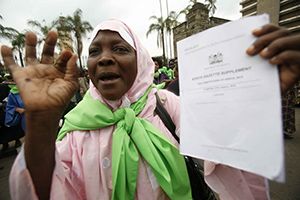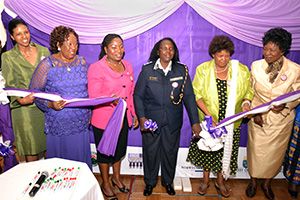Women elected to one-fifth of seats during Kenyan elections
Date:

With the focus of local and international media on Kenya’s ability to maintain peace and stability, improvements in women’s political participation were an unsung success story of the country’s national elections, held earlier this month.
After one of the most high-profile campaigns in Kenyan history, 87 of the 416 seats in the newly-established National Assembly and Senate chambers will be held by women. Previously, just 22 women sat in the old 222-seat Parliament, which did not have a Senate.
Amina Abdalla, a female MP for the past ten years, says that: “This is an historic high for Kenyan women. One-fifth of seats will be held by women- doubling our representation.”
Abdalla is keen to emphasize that electoral success for women didn’t happen overnight: “Constitutional support, increased support from party leadership, and training and support provided to women candidates made an impact.”
The process began as Kenya’s new Constitution was drafted. UN Women supported a five-year civil society campaign for the enshrinement of key rights, including a ban on all forms of violence against women and girls, the right to own land, and equality in marriage. The campaign also included the right to political representation, in the form of a rule stating that no more than two-thirds of elected seats could be held by persons of either gender. In 2010, Kenyans overwhelmingly endorsed the new Constitution, heralding a step forward for women, and a new era for the country.
In 2012, UN Women, with UNDP, established a ‘team of eminent persons’- prominent Kenyan advocates for women’s rights, who met with the Independent Electoral and Boundaries Commission and political parties to ensure that nomination lists included the required number of women. After nominations closed, UN Women worked with partners to train and support female candidates from all parties, in all 47 counties.
Then the Campaign for Women in Leadership kicked off- designed to encourage all voters to consider electing women to positions of leadership. It featured advertising in major newspapers as well as TV and radio stations, in local languages.
Situation room to deal with electoral violence

UN Women Country Director Zebib Kavuma says that it “provided women and youth organizations with a platform to respond rapidly to election-related incidents through a coordinated system.”
With 500 trained observers in the field, over 1,200 reports were made to the Situation Room in just three weeks, ranging from electoral complaints, threats, damage to property, and a small number of violent incidents. The team of eminent persons was on hand to take up and resolve each report as it was raised.
While the ‘two-thirds rule’of the Constitution requires that another 52 women be nominated by political parties before 2015, for MPs, civil society, and UN Women, the next step is to ensure this process is conducted swiftly and fairly.
Abdallah is pleased that her country’s new electoral system has started on a positive note, but cautions that the Constitution’s promise has not yet been fully realized. “This is a good start, but there’s a long way to go,” she says.
Related news:
- As elections approach, school kids cast their vote against violence in Kenya
- Women’s Situation Room aims to prevent conflict and ensure peaceful elections in Sierra Leone
- From conflict resolution to prevention: connecting Peace Huts to the police in Liberia
- In Sierra Leone, women candidates prepare their political platforms